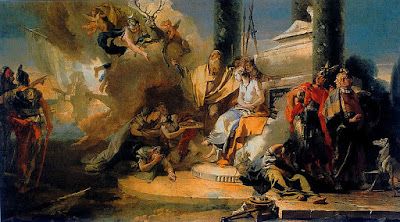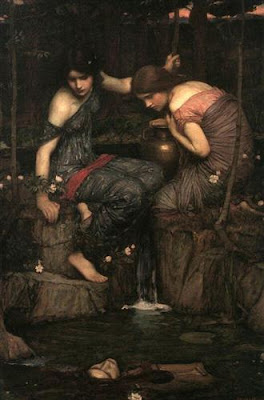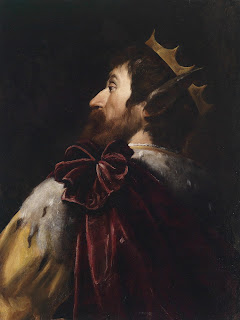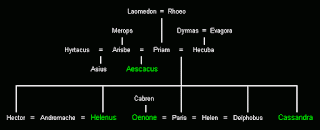 |
| The Return of Orestes (1785) Anton von Maron source Wikimedia Commons |

 |
| The Return of Orestes (1785) Anton von Maron source Wikimedia Commons |
Ajax and Ulysses contend for the armour of the fallen hero, Achilles. In spite of proclaiming himself a man of action and not one for florid speech, Ajax commences a rhetorical banquet, listing all his ancestors and spewing vitriol against Ulysses. Ajax’s father is Telamon, who was friend to Hercules as he destroyed Troy’s walls, sailed in the ship with Jason and was born of Aecus. In fact, he is a descendant of Jove, a honour he shares with Achilles, etc., etc. Ulysses is nothing but a smooth talking, lily-livered, cowardly, sneaky, dishonest fraud. Oh, and all his feats are minor. In fact, he, Ajax, should be the winner of the armour because his own shield is so damaged with fighting, yet Ulysses’ shield is so little used. He suggests that the armour be thrown among the Trojans and whoever reclaims it, be it him or Ulysses, will be the victor.
 |
| Jesus and Mary Magdalene (c. 1534) Antonio da Corregio source Wikimedia Commons |
 |
| The Three Marys at the Tomb of Christ (c.1603) Adam Elsheimer source Wikimedia Commons |
** paintings above are The Resurrection of Christ (1565) by Tintoretto & Resurrection of Christ (1875) by Carl Bloch, both on Wikiart. I had so much trouble with this post —- Blogger deleting whole posts, etc. that I’m terrified to touch anything else! Happy Easter everyone!
Thanks to Amanda, here’s the poem in song!
“No one who had ever seen Catherine Morland in her infancy would have supposed her born to be an heroine.”
While Northanger Abbey was the first novel written by Jane Austen and sold to a publisher by her brother, Henry, in fact it was repurchased by the author and not published until six months after her death in December 1817. Austen’s parody of 17th century Gothic novels is told with a good-natured humour, but a valuable lesson lies beneath the surface of its narrative.
My ninth choice for my Deal Me In Challenge comes from “diamonds,” my poetry section. I have completely avoided my short story section so far, not out of design, but out of fate. I just haven’t chosen a club yet. In any case, for this choice we move to France and the poetry of Victor Hugo.
 |
| The Sacrifice of Iphigenia (1770) Giovanni Battista Tiepolo source Wikimedia Commons |
I seem to be getting mostly essays lately for my Deal Me In Challenge. This week, I read The World of Tomorrow by E.B. White, the famed author of Charlotte’s Web. White wrote this essay about the 1939 World’s Fair in New York, where visions of the future abounded and a bright tomorrow was laid before eager and credulous eyes.
“The eyes of the fair are on the future —- not in the sense of peering toward the unknown nor attempting to foretell the events of tomorrow and the shape of things to come, but in the sense of presenting a new and clearer view of today in preparation for tomorrow; a view of the forces and ideas that prevail as well as the machines.
To the visitors the Fair will say, ‘Here are the materials, ideas and forces at work in our world. These are the tools with which the forces of the World of Tomorrow must be made. They are all interesting and much effort has been expended to lay them before you in an interesting way. Familiarity with today is the best preparation for the future.”
( ~ official New York World’s Fair pamphlet)
 |
| British Pavilion source Wikipedia |
Someone is obviously trying to sell something grand, and it was enlightening to read about White’s experience at the Fair. Right from the start, we sense a disconnect between the two, as he personifies the event. His first sentences read: “I wasn’t really prepared for the World’s Fair last week, and it certainly wasn’t prepared for me. Between the two of us there was considerable of a mixup.” White informs the reader that upon his visit, he had a cold and that “when you can’t breath through your nose, Tomorrow seems strangely like the day before yesterday.” He then gives a catalogue of the exhibitors with strangely impersonal names such as Kix, Astring-O-Sol, Textene, Alka-Seltzer and the Fidelity National Bank. White’s impressions do not inspire awe or a trust in Tomorrow.
“It is all rather serious-minded, this World of Tomorrow, and extremely impersonal. A ride on the Futurama of General Motors induces approximately the same emotional response as a trip through the Cathedral of St. John the Divine. The countryside unfolds before you in $5-million micro-lovliness, conceived in motion and executed by Norman Bel Geddes. The voice is a voice of utmost respect, of complete religious faith in the eternal benefaction of faster travel …….. When night fall in the General Motors exhibit and you lean back in the cushioned chair (yourself in motion and the world so still) and hear (from the depths of the chair) the soft electric assurance of a better life — the life which rests on wheels alone — there is a strong, sweet poison which infects the blood. I didn’t want to wake up. I liked 1960 in purple light, going a hundred miles an hour around impossible turns ever onward toward the certified cities of the flawless future. It wasn’t till I passed an apple orchard and saw the trees, each blooming under its own canopy of glass, that I perceived that even the General Motors dream as dreams so often do, left some questions unanswered about the future. The apple tree of Tomorrow, abloom under its inviolate hood, makes you stop and wonder. How will the little boy climb it? Where will the bird build its nest?”
White makes a few other observations which are very powerful statements:
“In Tomorrow, people and objects are not lit from above but from below”
“Rugs do not slip in Tomorrow, and the bassinets of newborn infants are wired against kidnappers. There is no talking back in Tomorrow. You are expected to take it or leave it alone.”
“In Tomorrow, most sounds are not the sounds themselves but a memory of sounds, or an electrification.”
At the end of the essay, instead of remembering the Fair itself, White’s recollections are quite different: the trees at night, eerie shadows, fountains in the light, a girl, remembered not just as passing impressions, but in generous detail. The last line of the essay stabs home his point:
“Here was the Fair, all fairs, in pantomime; and here the strange mixed dream that made the Fair: the heroic man, bloodless and perfect and enormous, created in his own image, and in his hand (rubber, aspetic) the literal desire, the warm and living breast.”
After my first read of this essay, I was left completely unmoved. I had no interest in the 1939 World’s Fair, and White’s ramblings about his cold, standing in line, etc. which I found annoyingly pointless. It was only when I read the essay for a second time, that his consummate skill as a writer drummed me over the head. Though not stating his views outright, with each sentence White was building his case, having the reader experience the loss of humanness and empathy that the rapid rise of technology was moving towards. When one places the value of machines and progress above the people they are supposed to be serving, you lose the human qualities of life and the simplicity, the wonder and human connection in life that make it so fulfilling.
Perhaps it’s telling that White moved from New York to Maine that very year.
Deal Me In Challenge #8
As you’re probably aware from both my On Reading the Faerie Queene and Spenser’s Images of Life posts, I’m gearing up to read The Faerie Queene in late April. But instead of sliding quietly into the read-along, I thought it might be nice to give it an official announcement!
O at Behold the Stars was the instigator of this event and Jean, Cirtnecce, Ruth, Consoled Reader and I quickly followed her lead. We will be attempting to stick to this schedule:
Thanks to O for the prod, and to Jean’s husband for creating a rather awesome button! Anyone else who would like to join us is very welcome! Reading this tome among friends will make it much less intimidating!
And, coincidentally corresponding with the above read, in April Hamlette from The Edge of the Precipice is going to be hosting a Poetry Month Celebration in honour of National Poetry Month.
We’ll be starting The Faerie Queene read-along near the end of the month, but I hope to be able to read a few more poems, at least one per week, for this event. It’s a good chance to focus on that category for my Deal Me In Challenge.
So if either of these events interest you, I hope you’ll join us for a very busy April, and ring in the spring with poetry!
 |
| The Sacrifice of Ipheginia by Agamemnon (1671) Jan Steen source |
Agamemnon is the first of a trilogy of plays called The Oresteia, the next two plays being The Libation Bearers and The Eumenides, all performed in 458 B.C., only two years before the death of Aeschylus. This surviving unified trilogy allows the reader to experience the development of these three-part stories and to observe the common strands of informatiion and enlightenment winding throughout. Each play would have built support and framework for the others. However, even though we have all three plays of this trilogy, the satyr play Proteus is lost, as it would have been a type of comic epilogue to finish The Oresteia.
Orpheus / The Bacchantes / Midas / Troy / Peleus & Thetis / Ceyx / Daedalion / The Wolf / Ceyx & Alcyone / Aesacus
Orpheus charms the beasts and trees with his songs, and even the stones pause to listen. But the Thracian women, the Bacchantes, are enraged, accusing Orpheus of scorning them. They hurl staffs and rocks at him, intent on murder but when a stone is flung,
Circling him, the women attack, and all of their weapons would have been tamed by his sweet music, if their “shrieks and caterwauls” had not drowned it out, and they murder and dismember him. Mournful sounds fill the air as his body is carried by the Hebrus river to the coast. There, a snake attempts to attack the head, but before it can, Phoebus turns it into stone. As the Shade of Orpheus descends to the Underworld, he meets Eurydice. Side by side, they walk and they can now gaze at each other without fear.
 |
| Nymphs finding the head of Orpheus (1900) John William Waterhouse source Wikiart |
 |
| König Midas (1670) Andrea Vaccaro source Wikimedia Commons |
 |
| Apollo and Poseidon Punishing Troy (c. 1590) Paolo Fiammingo source Wikimedia Commons |
 |
| The Feast of Peleus (1872-81) Edward Burne-Jones source Wikimedia Commons |
Ceyx tells of his brother, Daedalion, who had a lovely fourteen-year-old daughter, Chione. She was raped by both Phoebus and Mercury, bearing twin sons but one from each god: Autolycus, “a connoisseur of wiles and guiles”, and Phillamon, Apollo’s son, “famed for lyre and song.” Chione, because of this glory bestowed on her, now considered herself surpassing Diana’s beauty, and, for her insult, she was killed by an arrow of the goddess. At her funeral (burning), Daedalion overcome with grief, ran senselessly around, finally leaping from Parnassus’ peak, where Apollo changed him into a hawk, and “aggrieved, he makes all others mourn.”
As Ceyx relates this story, Peleus’ Phocian cowherd rushes in to announce that a wolf is ravaging the herds of oxen and terrifying the people. Peleus silently believes this event to be his penance for his crime. As they prepare to leave to deal with the wolf, Alcyone, the wife of Ceyx, begs him not to go, foreseeing his death. Thetis intervenes to pardon Peleus and helps him, changing the wolf into a marble statue. But the fates cause Peleus to travel to the land of Magnesia and King Acastus, where he is cleansed of his guilt.
Meanwhile Ceyx is still puzzled by his brother’s fate and these strange happenings, so he decides to consult an oracle on the isle of Clarus. Alcyone begs him not to go, but, while trying to calm her fears, he departs and his boat encounters a momentous storm. Before he drowns, he prays that his body will return to his wife for burial, and she finally spots it floating in the water, confirmation of her husband’s death that she had received in a dream conducted by Morpheus. As she tries to reach the body, she is changed into a bird (a kingfisher), and when she tries to cover her husband with her wings, he too changes:
 |
| Halcyone seeking her husband Ceyx (1914) Herbert James Draper source Wikimedia Commons |
An old man, as he watches the pair of birds, is reminded of another bird, a swift merganser. The bird is of the line of Ilus and Assaracus, then Ganymede, then Laomedeon, and finally Priam, who was the last king of Troy. Aesacus, half-brother of Hector (son of Priam) pursued the nymph, Hesperie, who was bitten by a serpent as she fled. Distraught, Aesacus offered his life for hers. As he leapt into the sea, Thetis pitied him and clothed him in feathers, but Aesacus so diligently sought death, he continually attempts to plunge in the sea, only to rise again. He is the diving bird, the merganser.
 |
| source |
In this book, I noticed varying motifs on music, sound and hearing. Orpheus communicates by music, yet is drowned out by the Bacchantes’ shrieks; Apollo and Pan have a musical contest; Mt Tmolus must brush away the forest to hear; Midas for hearing ‘incorrectly’ has his ears changed to those of an ass; Proteus’ words are stopped/finished as he sinks into the sea; on Ceyx’s ship, the captain’s voice in drowned out by the “blustering winds”; Ceyx’s words are impeded by the waves; and the Cimmerian cave is a place of complete silence yet for the Lethe.
While the stories often seem random, we can experience a non-linear telling of some of the history of Troy and its heroes. The scattering make up a puzzle, if we can only pick up the pieces and fit them into the whole.
Metamorphoses
Snake ❥ stone
Thracian women ❥ oak trees
Midas’ touch ❥ gold
Midas’ ears ❥ ears of an ass
Thetis ❥ bird/tree/spotted tigress
Thetis ❥ various shapes ❥ Thetis
Daedalion ❥ hawk
Wolf ❥ marble statue
Ceyx & Alcyone ❥ birds (kingfishers)
Aesacus ❥ merganser (“diving bird”)